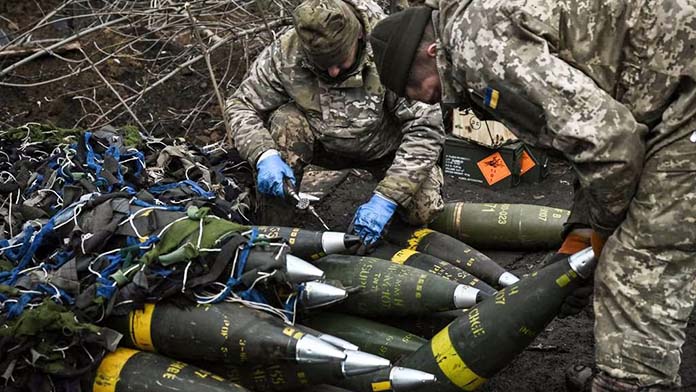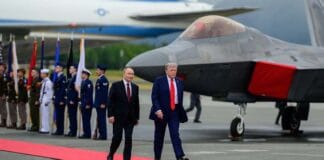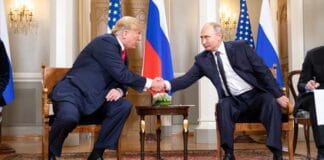The two-year anniversary of the war in Ukraine was marked by the Russian capture of the strategically important Ukrainian city of Avdiivka.
The last year of grinding bloodshed with little military gains on either side—but massive casualties—has given way to a consensus the advantage has swung in Russia’s favour.
There was a whiff of panic from Western European commentators and leaders at the Munich Security Conference in February. Some talked of the potential for Russia to invade another NATO country if it eventually wins in Ukraine.
A week later French President Emmanuel Macron publicly stated that NATO countries sending troops directly into Ukraine “could not be ruled out”, after this was discussed at a meeting of 25 European leaders Macron hosted.
This would mean a direct war between NATO and Russia, something the US has sought to avoid because it would mean a direct confrontation between nuclear armed powers. Predictably, Putin responded by threatening to use nuclear weapons if NATO troops were within striking distance of Russia.
The scaremongering about Russia is really driven by a desire to speed up arms production and shipments to Ukraine.
An acute shortage of artillery shells is the main reason why Russia was able to take Avdiivka, according to Ukrainian commanders and the White House.
In February the European Union passed a $54 billion aid package for Ukraine, to last until 2027. But this was mostly financial aid.
Europe’s military production is still far too small to meet Ukraine’s needs. It has only met half of its promise a year ago to deliver one million artillery shells. Europe still needs the US to project military power.
But US President Joe Biden hasn’t been able to get $61.4 billion in new military funding for Ukraine through Congress due to Republican opposition.
Ukraine is totally dependent on Western backing to continue the war, showing without a doubt the proxy-war nature of the conflict.
The extent of NATO involvement was reinforced by a leak in Russian media revealing that British soldiers are secretly “on the ground” in Ukraine helping to launch the long-range Storm Shadow missiles.
Russian resilience
But Russia’s war economy is outproducing the US and Europe.
The Financial Times describes how “Russia will churn out some 2 million artillery shells this year and has acquired a further 2 million from North Korea. It can deliver more than 100 tanks a month to the army, although many are refurbished. The Russian army will recruit another 400,000 men this year without resorting to full-scale mobilisation, Ukrainian officials forecast.”
Financial sanctions against Russia have not crippled it as hoped. And according to Western experts new sanctions Biden has introduced will fail to reduce the billions of dollars in energy profits that Russian President Vladimir Putin has used to finance the war.
The US announced that it would sanction Russia’s largest shipping company Sovcomflot who publicly claim to operate 147 ships and oil tankers. However, all but 14 of its vessels are exempt from the sanctions.
Russia’s GDP grew by 3 per cent last year, faster than all the G7 economies, and the International Monetary Fund (IMF) predicts that it will outpace them again in 2024.
The IMF revised its growth forecasts for Russia for this year from 1.5 per cent to 2.6 per cent.
The US is cautious about sanctioning Russian oil too aggressively, as this could cause an international hike in oil prices, resulting in more money for Putin and a surge in inflation.
Biden wants to keep the war going to bleed and weaken Russia at the cost of more deaths of both Ukrainians and Russians. The US has opposed negotiations for a ceasefire from the beginning.
Putin is ruthless and power-hungry, as his assumed murder of opposition figure Alexei Navalny in a Siberian prison shows. But the US, NATO, and its allies like Australia are not benign or democratic powers.
The West talks of a “rules based international order” when it suits them, but they have no issue funding and supporting allies like Israel, which is committing genocide and breaks every international humanitarian law.
Western states are using Ukrainians as a cheap way of protecting their own imperialist interests.
Martin Wolf of the Financial Times sums it up succinctly: “Aiding Ukraine is… cheap. No Western soldiers are at risk. The sums to be agreed this year amount to less than 0.25 percent of the combined GDP of the EU, UK and US”.
Palestine supporters rightly use Western support for Ukraine to expose government hypocrisy. But support for arming Ukraine is also used to allow weapons companies into schools and universities, although the West is arming Ukraine only to maintain their imperialist interests in the bloody proxy war with Russia.
They want ordinary people to keep dying in Ukraine to advance their power and profits.
We must oppose sending more weapons for the slaughter in Ukraine. The hope lies in anti-war rebellions in Russia, NATO, and Ukraine to end the war.
By Luke Ottavi






